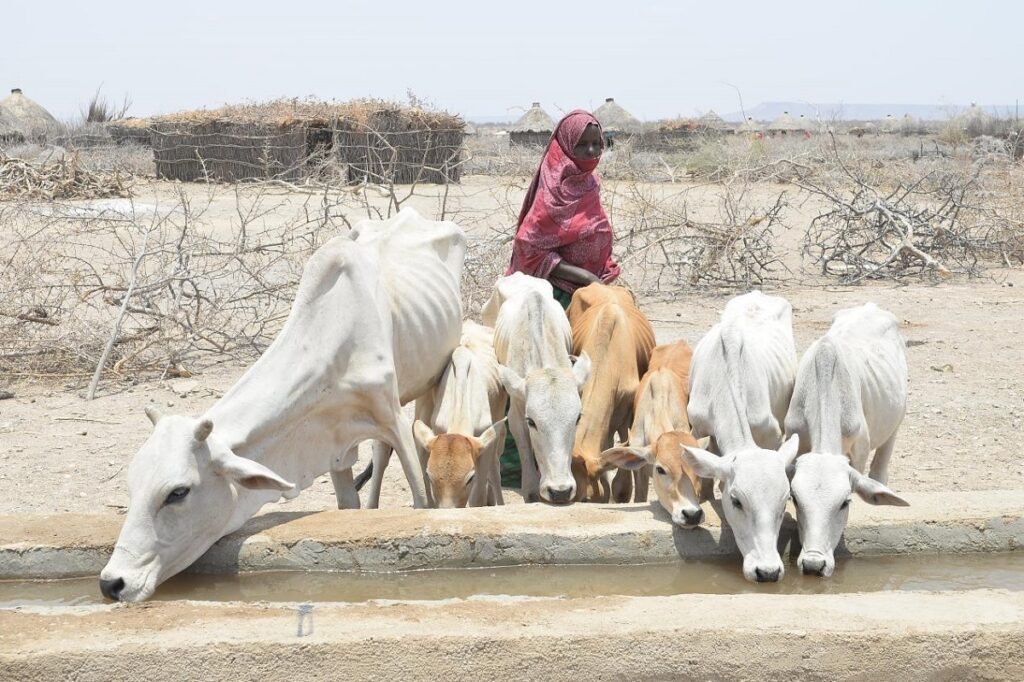- A new report shows that climate finance going to small-scale farmers has decreased by 44 per cent.
- As a result, farm yields could drastically drop by up to 80 per cent, as shown by surveys commissioned by the UN’s International Fund for Agricultural Development (IFAD).
- In comparison, climate finance is on the upswing in various sectors, such as energy and transport.
Ahead of COP28, the UN’s International Fund for Agricultural Development (IFAD) is calling on leaders across the globe to shift gears and drastically and urgently scale up climate finance for small-scale farmers and small agribusinesses, who produce one-third of the world’s food and up to 70 per cent of the food in low- and middle-income countries. Many of these farmers are grappling with the negative impacts of climate change.
Yet, climate finance going to small-scale agrifood systems has decreased by 44 per cent and is now as low as 0.8 per cent of total climate finance, falling far short of needs. A new report published by the ClimateShot Investor Coalition (CLIC) and the Climate Policy Initiative (CPI) reveals.
“This trend is extremely worrying. We are going in the wrong direction. Small-scale farmers, who feed entire communities and nations in the developing world, need to be able to adapt to climate change now. If they don’t, their lives and livelihoods – and global food security -are at risk,” said Alvaro Lario, IFAD President.
Crop yields to fall as small-scale farmers remain vulnerable
Small-scale farmers are often on the climate frontlines, living in vulnerable areas and exposed to extreme weather events. Crop yields are predicted to fall by up to a quarter by the end of the century. In some cases, yields could drastically drop by up to 80 per cent, as shown by case studies that IFAD commissioned in 2021. Many of the three billion people living in the rural areas of developing countries rely extensively on small-scale farming for a living and their food supply.
Yet, according to the new analysis, “The Climate Finance Gap for Small Scale Agrifood Systems” (which includes small-scale farmers, farmers organizations, cooperative and also micro-, small rural agribusinesses serving them), is strikingly low, falling to $5.53 billion, representing less than 0.8 per cent of global climate finance in 2019/2020. The amount has fallen by 44 per cent compared to 2017/2018, when it reached $9.85 billion.
While climate finance is on the upswing in various sectors such as energy and transport, there is a notable decline in finance funding, mirroring a 20 per cent decrease observed in the agriculture, forestry, and other land use sectors during the same period.
“Investments are slowing down when they should be drastically accelerating. This is extremely disturbing as solutions to help small-scale farmers to adapt do exist,” said Lario. “We have the know-how and the technology, what we need are investments now.”
Read also: COP28 President pushes for climate finance reforms in Africa
Climate-resilient and low-emission irrigation systems
Tailored for small-scale farming, solutions such as climate-resilient and low-emission irrigation systems, agroecology, agroforestry practices, improved soil management, and crop diversification play a vital role. Additionally, crucial measures include early-warning and climate information systems and climate-proof infrastructure like flood-resistant food storage units and rural roads to prevent loss and damage.
Given the constraints on national budgets and the challenging debt situations many developing countries face, IFAD emphasizes the need for private-sector investment.
“Governments, finance institutions and the private sector all have a role to play to bring more finance to small-scale farming systems. We must convert National Determined Contributions and National Adaptation Plans into investment plans with a pipeline of bankable projects, and deploy innovative financial instruments to de-risk and attract private investments,” said Lario. “Investing in climate-smart small-scale agriculture is good for the planet and is good for businesses, it means more stability and guaranteed commodities supplies.”
IFAD is developing innovative financial mechanisms to attract private investors. In June 2022, IFAD marked a historic moment by issuing its inaugural sustainable bonds, becoming the first United Nations Fund and the sole UN body, aside from the World Bank Group, to venture into capital markets. Recently, IFAD celebrated the listing of its sustainable bonds by opening the London Stock Exchange (LSE) markets.
With a track record of over a decade in supporting small-scale farmers to adapt to climate change, IFAD has invested significantly, allocating $1.2 billion, predominantly for adaptation activities between 2019-2021. It also manages the Adaptation for Small Scale Farmer Programme (ASAP+), a multimillion-dollar climate adaptation fund for small-scale farmers.
Read also: What is Africa’s stake at the upcoming Dubai COP28
IFAD directing more climate funding to rural areas
In response to the pressing need, IFAD is intensifying its initiatives to direct more climate funding to rural areas. It has committed to allocating 40 per cent of its core resources to climate action, focusing on adaptation, for the 2022-2024 period—an increase from the previous three-year period (2019-2021), where 35 per cent was dedicated. IFAD aims to achieve a 45 per cent target for 2025-2027 in collaboration with its member states.
In anticipation of COP28, IFAD will release a white paper outlining a business case for investing in climate-adaptive, water-resilient food systems. This document will highlight the importance of benefit sharing, bundling, building bankable investments, and blending for financing in this crucial area.
